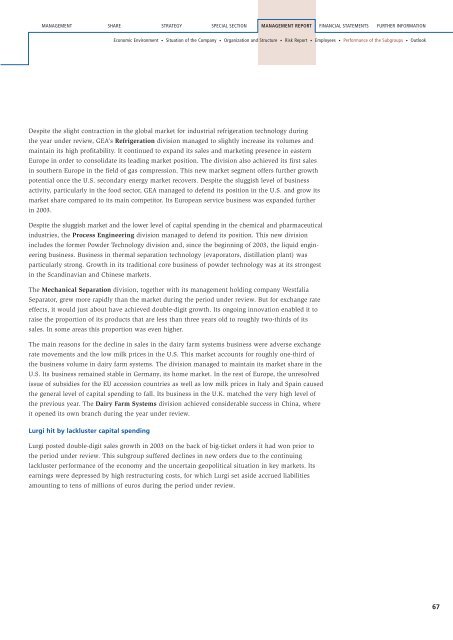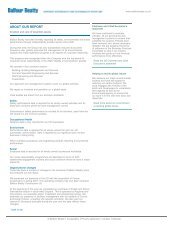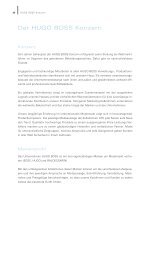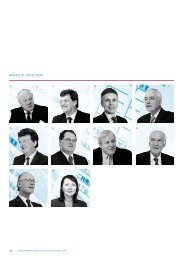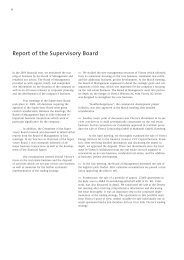E_mg_GB_03_vorne-29_3_04
E_mg_GB_03_vorne-29_3_04
E_mg_GB_03_vorne-29_3_04
You also want an ePaper? Increase the reach of your titles
YUMPU automatically turns print PDFs into web optimized ePapers that Google loves.
MANAGEMENT SHARE STRATEGY SPECIAL SECTION MANAGEMENT REPORT FINANCIAL STATEMENTS FURTHER INFORMATION<br />
Economic Environment • Situation of the Company • Organization and Structure • Risk Report • Employees • Performance of the Subgroups • Outlook<br />
Despite the slight contraction in the global market for industrial refrigeration technology during<br />
the year under review, GEA’s Refrigeration division managed to slightly increase its volumes and<br />
maintain its high profitability. It continued to expand its sales and marketing presence in eastern<br />
Europe in order to consolidate its leading market position. The division also achieved its first sales<br />
in southern Europe in the field of gas compression. This new market segment offers further growth<br />
potential once the U.S. secondary energy market recovers. Despite the sluggish level of business<br />
activity, particularly in the food sector, GEA managed to defend its position in the U.S. and grow its<br />
market share compared to its main competitor. Its European service business was expanded further<br />
in 20<strong>03</strong>.<br />
Despite the sluggish market and the lower level of capital spending in the chemical and pharmaceutical<br />
industries, the Process Engineering division managed to defend its position. This new division<br />
includes the former Powder Technology division and, since the beginning of 20<strong>03</strong>, the liquid engineering<br />
business. Business in thermal separation technology (evaporators, distillation plant) was<br />
particularly strong. Growth in its traditional core business of powder technology was at its strongest<br />
in the Scandinavian and Chinese markets.<br />
The Mechanical Separation division, together with its management holding company Westfalia<br />
Separator, grew more rapidly than the market during the period under review. But for exchange rate<br />
effects, it would just about have achieved double-digit growth. Its ongoing innovation enabled it to<br />
raise the proportion of its products that are less than three years old to roughly two-thirds of its<br />
sales. In some areas this proportion was even higher.<br />
The main reasons for the decline in sales in the dairy farm systems business were adverse exchange<br />
rate movements and the low milk prices in the U.S. This market accounts for roughly one-third of<br />
the business volume in dairy farm systems. The division managed to maintain its market share in the<br />
U.S. Its business remained stable in Germany, its home market. In the rest of Europe, the unresolved<br />
issue of subsidies for the EU accession countries as well as low milk prices in Italy and Spain caused<br />
the general level of capital spending to fall. Its business in the U.K. matched the very high level of<br />
the previous year. The Dairy Farm Systems division achieved considerable success in China, where<br />
it opened its own branch during the year under review.<br />
Lurgi hit by lackluster capital spending<br />
Lurgi posted double-digit sales growth in 20<strong>03</strong> on the back of big-ticket orders it had won prior to<br />
the period under review. This subgroup suffered declines in new orders due to the continuing<br />
lackluster performance of the economy and the uncertain geopolitical situation in key markets. Its<br />
earnings were depressed by high restructuring costs, for which Lurgi set aside accrued liabilities<br />
amounting to tens of millions of euros during the period under review.<br />
67


